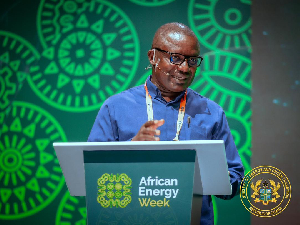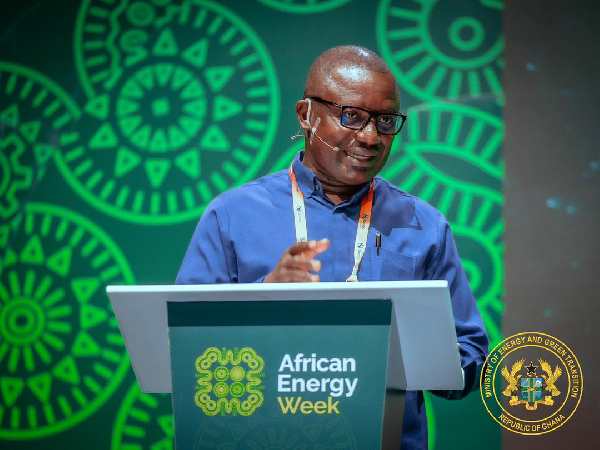 Minister of Energy and Green Transition, John Abdulai Jinapor
Minister of Energy and Green Transition, John Abdulai Jinapor
Ghana’s Minister of Energy and Green Transition, John Abdulai Jinapor, has called on African nations to take charge of their own energy transition agenda, stressing that the continent cannot afford to have its future dictated by external powers.
Delivering a keynote address at the Africa Energy Week 2025 in Cape Town, South Africa, the minister urged policymakers, investors and industry leaders to position Africa as a global energy leader while ensuring that the transition remains “just” and reflective of the continent’s unique needs.
Speaking on the theme “Invest in African Energies: Positioning Africa as the Global Energy Champion”, Jinapor described Africa’s energy story as a paradox, where a continent rich in resources continues to grapple with deep energy poverty.
“For generations, Africa has fueled the world’s progress while our own people remain in the dark,” he said.
“This gathering marks the end of that narrative. We are not here with outstretched hands, hoping for a seat at a table we did not build. We are here as master builders, ready to lead the next chapter of the world’s energy future.”
He stressed that Africa must not only attract investment but ensure that partnerships create long-term value for its people, adding that governments across the continent are implementing targeted incentives, enabling policies, and infrastructure projects to make Africa the most attractive destination for sustainable energy investments.
Jinapor also challenged the global community to recognise Africa’s right to define its own transition pathway.
“A ‘Just Transition’ cannot be a rigid blueprint drafted in Brussels, Washington, or Beijing and handed to us as a mandate,” he argued.
“Africa, contributing less than 4% of global emissions, cannot be forced to pay the price for problems it did not create.”
He said the continent’s energy transition must move beyond simply replacing fossil fuels with renewables to addressing energy poverty, industrialisation, and youth employment.
Over 600 million Africans still lack access to electricity, he noted, describing it as a crisis in education, healthcare and economic opportunity.
The minister reaffirmed Africa’s right to use its abundant oil and gas resources, which include 125 billion barrels of proven oil reserves and 620 trillion cubic feet of natural gas, as a foundation for financing the transition.
“Our approach is not to choose between fossil fuels and renewables, but to strategically integrate both to power growth, jobs and resilience,” he said.
Concluding his address, Jinapor insisted that Africa must reject any transition model that stifles development or deepens poverty.
“Africa’s energy future must be written by Africa and for Africa,” he declared.
“We must build an energy future that is uniquely African one that delivers power to our people, creates wealth for our communities and ends the injustice of energy scarcity.”
The minister’s speech drew strong applause from delegates, many of whom echoed his call for Africa to play a central role in shaping the global energy future.
